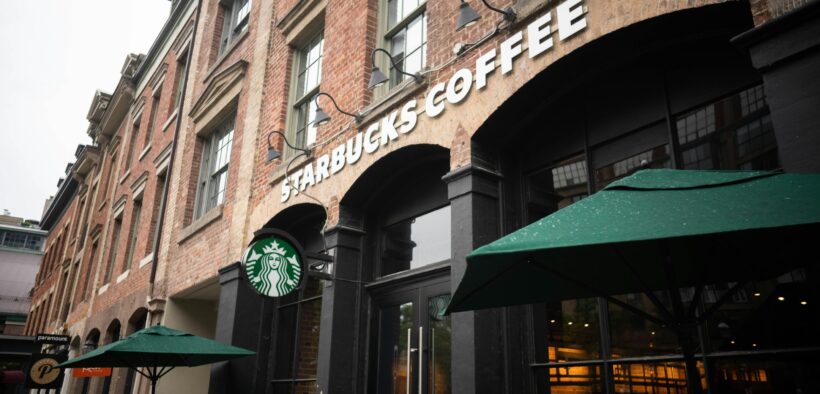A Grande Peppermint Mocha with Extra Union Busting: Starbucks’ Record of Labor Law Violations
Share

Image Credits: @trance on Unsplash (Unsplash License)
In the last year, unions have gained newfound attention amid efforts to organize and bargain for American workers. In the entertainment industry, SAG-AFTRA and the WGA were simultaneously on strike for months, gaining new protections for the actors and writers they represent. The United Auto Workers (UWA) launched an unheard-of strike at all three of the country’s major auto manufacturers: General Motors, Stellantis, and Ford. On November 16, 2023, also known as Red Cup Day, Starbucks workers walked out. Union organizing dates back decades in both the entertainment and auto industries, but Starbucks unionization began rather recently.
History of Starbucks and Howard Shultz
Starbucks was founded in 1971 in Seattle, Washington at the “historic Pike Place Market.” The company began with one location operated by two brothers up until the early 1980s. In 1982, Howard Shultz joined the company and later became CEO in 1986. Shultz grew Starbucks into a coffee giant, but he also left an anti-union track record.
Shultz denies the claim, arguing instead, “I’m not an anti-union person. I am pro-Starbucks, pro-partner, pro-Starbucks culture. We didn’t get here by having a union.” However, his record shows opposition to union campaigns in the 1990s and 2000s.
The most substantial unionization campaign at Starbucks took off in 2021 after the COVID-19 pandemic. At the time, Shultz was not serving as CEO but was later brought in as interim CEO between 2022 and 2023.
The latest efforts began with a union election at a Starbucks location in Buffalo, New York. Employees voted overwhelmingly to unionize with Starbucks Workers United, an affiliate of the larger union Workers United. As of 2023, Starbucks Workers United now represents approximately 340 locations and 8,700 workers.
Union organizers have repeatedly alleged that Starbucks, often at the behest of Howard Shultz, has violated labor law in order to stamp out unionization. In November 2023, workers filed additional complaints in New York City. Starbucks Workers United states, “If Starbucks believes in supporting the rights of its partners, it must recognize that it is not up to corporate to decide whether unions are necessary, but rather up to us, the Starbucks partners.”
Labor Law in the United States
Modern-day labor law in the United States traces back to the National Labor Relations Act, also known as the Wagner Act, which was a product of the New Deal Area. Passed by Congress in 1935, the act protects unionization and collective bargaining. To enforce protections, the act established the National Labor Relations Board, the federal labor law authority.
The Fair Labor Standards Act also provides for workplace standards, wages, recordkeeping, and regulations on youth employment. The Act adds a layer of protection for workers which Starbucks has been alleged to have violated.
According to the National Labor Relations Board, Starbucks has a well-documented record of violating labor law, including the NLRA and FLSA, since major unionization efforts began in 2021.
Violations of Labor Law
Starbucks has run amok of federal labor law with the National Labor Relations Board issuing nearly 80 complaints against them. In a ruling on March 2nd, 2023, an administrative judge described Starbucks’ behavior as “egregious and widespread misconduct.” Starbucks’ anti-union tactics include but are not limited to, permanently closing stores seeking to unionize, firing organizers of union campaigns, hosting “captive audience meetings,” surveilling workers, and laying off workers.
Starbucks closed two locations while unionization efforts were ongoing. In Kansas City, Missouri, employees were waiting for the results of their union election when the location was closed. Starbucks claimed the closure was due to safety and unrelated to the union effort. Another location in Seattle which had voted to unionize was also closed and restructured to a licensed location with a local grocery store.
Perhaps the most prominent story of union busting occurred when Starbucks fired seven union organizers in Memphis, Tennessee. Though the company denied that the employees were fired for unionizing, the National Labor Relations Board and the 6th Circuit Court of Appeals disagreed. Starbucks was ordered to reinstate the employees. Similar allegations were made against Starbucks when it terminated employees in Buffalo.
Another tactic utilized by Starbucks is “captive audience meetings.” These types of meetings allow management to discuss their positions on unionization with workers and ultimately discourage unionization. Though these meetings are not technically illegal, they are problematic considering the company’s obligation to not interfere in union elections. Union organizers and workers have raised concerns about this tactic to labor authorities as well.
Starbucks is also accused of surveilling workers, primarily those leading unionization efforts. This surveillance is tied to the company’s eventual termination or layoff of employees for reasons Starbucks claims are unrelated to unionization. In the case of the seven workers in Memphis, Starbucks claimed the employees allowed others in the store after hours.
A long list of labor law complaints are continuing to work their way through federal authorities as unionization at Starbucks continues. The issue has been brought before the United States Congress and the federal courts for various reasons.
Response from the United States Congress
In Congress, support for unions and protection for workers has gained momentum over the last few years. Congress has attempted to strengthen labor protections with the introduction of the Protecting the Right to Organize (PRO) Act. The PRO Act was initially introduced in 2019 during the 116th Congress and has continued through the 118th Congress. Versions exist in both the House of Representatives and the Senate.
In the United States Senate, the PRO Act has been championed by Senator Bernie Sanders who Chairs the Senate Health, Education, Labor, and Pensions Committee. Starbucks has been at the center of this issue.
In March 2023, Howard Shultz was brought before the Senate Health, Education, Labor, and Pensions Committee as the committee investigated anti-union tactics at the company. Shultz’s testimony and questioning lasted approximately three hours and the committee later released a report entitled “No Company is Above the Law” detailing the anti-union record of Starbucks.
A week before this hearing, Shultz stepped down as interim CEO of Starbucks, turning the company over to Laxman Narasimhan.
The Future of Unionization at Starbucks
Starbucks has a choice moving forward as unionization continues across its locations. On Red Cup Day, which is both the busiest day of the year and the kick-off of the holiday season at Starbucks, thousands of workers went on strike with Starbucks Workers United. They were joined at many locations across the country by customers and community members.
Trends in unionization and the perception from the American public has shifted in recent years. Following the COVID-19 pandemic, workers have gained new expectations for pay, benefits, and conditions. This has further been fueled by a labor market that favors workers and a rising minimum wage.
To steer away from further labor law violations and continue to be a favored company by the public, Starbucks may need to put an end to anti-union efforts.


Want to get involved?
Connect with us! Connect with us!